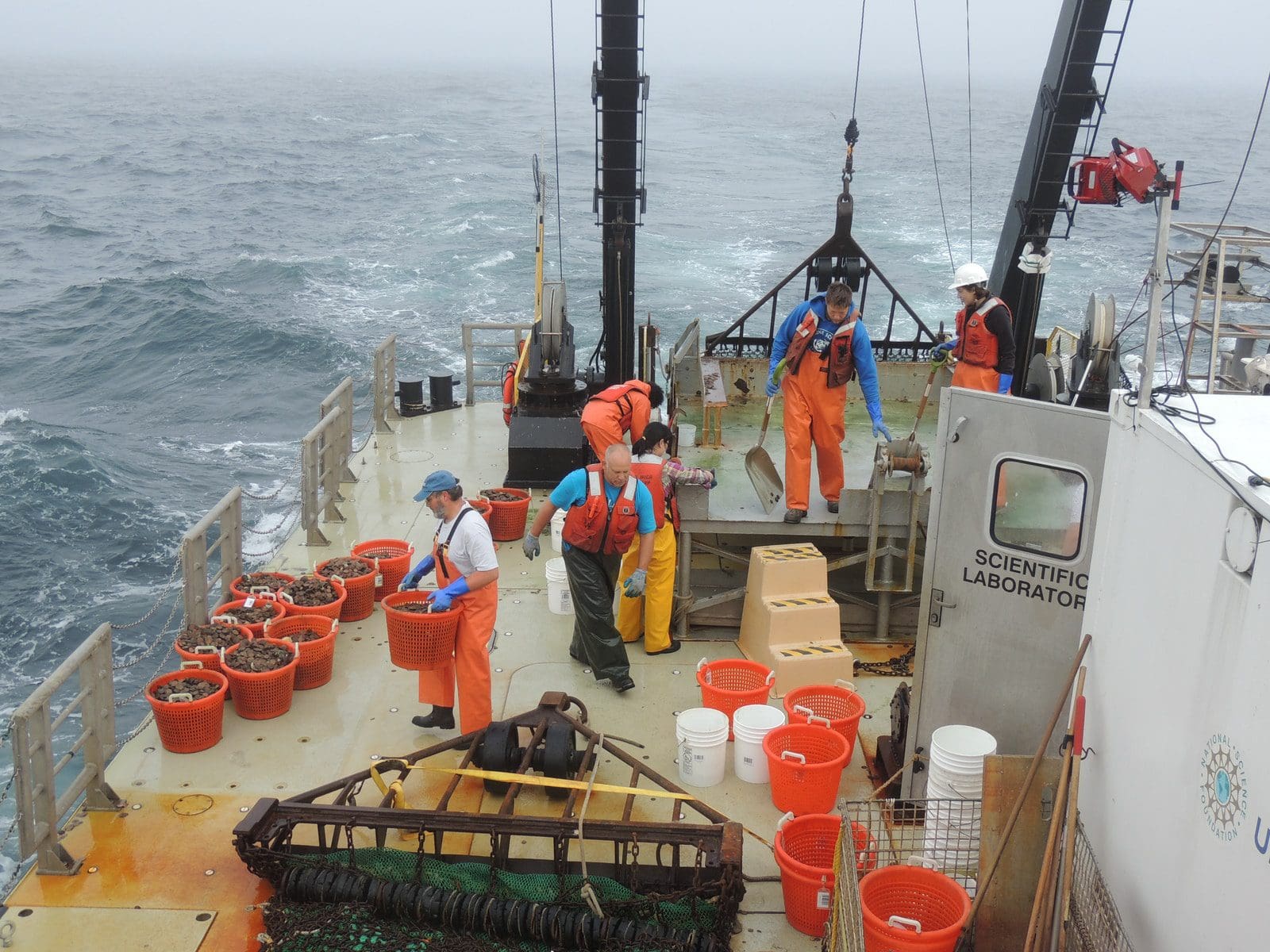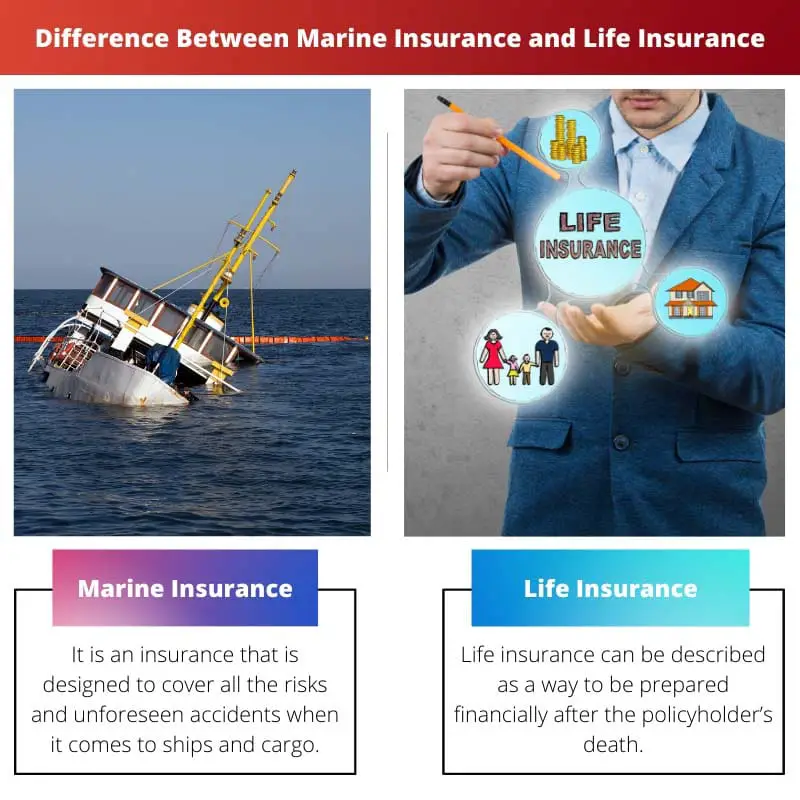Marine insurance primarily covers risks associated with maritime activities, safeguarding against damage or loss of ships, cargo, and related liabilities. On the other hand, life insurance provides financial protection to individuals and their beneficiaries in the event of the policyholder’s death, offering a lump sum or periodic payments.
Key Takeaways
- Marine insurance covers losses or damages to ships, cargo, and other marine assets during maritime transport, protecting against perils at sea.
- Life insurance is a long-term contract that provides a payout to beneficiaries upon the policyholder’s death, offering financial support for dependents.
- The primary difference between the two lies in the assets they protect: marine insurance focuses on maritime assets. In contrast, life insurance addresses financial security for beneficiaries in case of the policyholder’s death.
Marine Insurance vs Life Insurance
The difference between Marine insurance and Life insurance is that marine insurance is a policy that will protect mostly cargo, ship, and transport-related machinery. Also, the premium is done on a lump-sum basis in marine insurance, whereas life insurance premium is collected on an instalment basis.

The area that marine insurance covers are extensive and come with various types of insurance policies according to the needs. It mainly ensures any machinery related to a ship, transporting cargo, freight insurance and many others.
The definition of life insurance is pretty straightforward. You will pay a certain premium to the company to insure an individual or family.
It is a contract between the policyholder and the insurer covering a plan.
Life insurance comes with two types of policies, mainly as it does not cover a wider area like marine insurance. Though, you may choose from different sets of plans to invest in the future.
Comparison Table
| Feature | Marine Insurance | Life Insurance |
|---|---|---|
| What it Protects | Protects against loss or damage to ships, cargo, and related interests during maritime transportation | Provides financial benefits to beneficiaries upon the death of the insured or upon policy maturity (depending on the type) |
| Who Can Buy | Businesses involved in maritime transportation (shipping companies, freight forwarders, exporters) | Individuals seeking financial security for loved ones or themselves |
| Payout | Based on the insured value of the ship/cargo, limited to actual loss | Predetermined death benefit or accumulated cash value (depending on the type) |
| Type of Insurance | Property and Casualty Insurance | Risk Management and Investment (depending on the type) |
| Policy Term | Varies depending on the voyage or shipment | Typically 10-30 years, or until death of the insured (depending on the type) |
| Indemnity Principle | Applies – payout cannot exceed actual loss | Does not apply – death benefit is predetermined |
| Cost | Premiums based on risk factors like route, cargo type, and vessel size | Premiums based on age, health, lifestyle, and desired coverage amount |
What is Marine Insurance?
Overview of Marine Insurance
Marine insurance involves the transfer of risks related to maritime activities from the insured to the insurer in exchange for a premium. It is a vital component of international trade and commerce, providing financial protection against potential losses that can occur during the transportation of goods or the operation of vessels.
Types of Marine Insurance
A. Hull Insurance
Hull insurance covers damage or loss to the ship’s hull and machinery. It protects shipowners from various perils such as collisions, sinkings, and natural disasters. The coverage extends to the ship’s equipment, engines, and other essential components.
B. Cargo Insurance
Cargo insurance safeguards the interests of cargo owners by providing coverage for loss or damage to the goods during transportation. It includes protection against risks like theft, fire, rough handling, and natural disasters.
C. Liability Insurance
Marine liability insurance covers third-party liabilities arising from maritime activities. This includes damage to other vessels, injury to crew members, and environmental pollution. Shipowners, operators, and charterers often opt for liability insurance to mitigate potential legal and financial consequences.
Key Components of Marine Insurance
A. Premiums
Premiums are the periodic payments made by the insured to the insurer in exchange for coverage. The amount of the premium is determined by various factors, including the type of coverage, the value of the insured property, and the level of risk involved.
B. Policy Terms and Conditions
Marine insurance policies outline the terms and conditions of coverage. These documents specify the risks covered, exclusions, deductibles, and other essential details. Policyholders should carefully review these terms to understand the extent of their coverage.
C. Underwriting
Underwriting is the process by which insurers assess the risk associated with a particular policy. Insurers consider factors such as the type of vessel, its condition, the nature of the cargo, and the route to determine the appropriate premium and coverage.
Importance of Marine Insurance
A. Facilitating International Trade
Marine insurance plays a crucial role in facilitating global trade by providing financial protection to businesses involved in the import and export of goods. It ensures that potential losses do not hinder the smooth flow of goods across borders.
B. Risk Mitigation for Shipowners
For shipowners, marine insurance is a fundamental tool for managing the inherent risks of maritime operations. It enables them to navigate unpredictable situations and recover financially in the event of accidents or unforeseen events.
C. Legal Compliance
In many jurisdictions, marine insurance is a legal requirement for shipowners and operators. Complying with these regulations helps ensure that the maritime industry operates with a high level of responsibility and accountability.
Challenges in Marine Insurance
A. Dynamic Nature of Risks
The maritime industry is exposed to ever-changing risks, including weather-related perils, geopolitical issues, and technological challenges. Insurers face the ongoing challenge of adapting their coverage to address emerging risks.
B. Pricing and Market Conditions
The pricing of marine insurance premiums is influenced by market conditions, competition among insurers, and the overall economic climate. Fluctuations in these factors can impact the affordability and availability of marine insurance.

What is Life Insurance?
Types of Life Insurance
- Term Life Insurance:
- Duration: Provides coverage for a specific term, such as 10, 20, or 30 years.
- Death Benefit: Pays out only if the insured dies during the policy term.
- Affordability: Generally more affordable than permanent life insurance.
- Whole Life Insurance:
- Lifetime Coverage: Offers coverage for the entire lifetime of the insured.
- Cash Value: Accumulates a cash value over time, serving as an investment component.
- Premiums: Higher premiums compared to term life insurance.
- Universal Life Insurance:
- Flexibility: Allows flexibility in premium payments and death benefits.
- Cash Value: Accumulates cash value that can be invested.
- Adjustable Death Benefit: Policyholders can adjust the death benefit amount.
- Variable Life Insurance:
- Investment Options: Allows policyholders to invest the cash value in various investment options.
- Risk: Investment returns are subject to market fluctuations.
- Flexibility: Provides flexibility in premium payments and death benefits.
Key Components of Life Insurance
- Premiums:
- Payment: Policyholders pay regular premiums to keep the policy in force.
- Factors: Premiums are influenced by factors such as age, health, and coverage amount.
- Death Benefit:
- Payout: The sum paid to beneficiaries upon the death of the insured.
- Taxation: Generally, the death benefit is tax-free for beneficiaries.
- Cash Value:
- Accumulation: Present in permanent life insurance policies.
- Withdrawals: Policyholders can withdraw or borrow against the cash value.
Importance of Life Insurance
- Financial Security:
- Family Protection: Provides financial support to the insured’s family after their death.
- Income Replacement: Helps replace lost income and cover expenses.
- Debt Coverage:
- Mortgage and Loans: Can be used to pay off outstanding debts like mortgages and loans.
- Education Funding:
- College Expenses: Death benefit can be used to fund children’s education.
- Estate Planning:
- Estate Taxes: Life insurance can help cover estate taxes and preserve assets for heirs.
Considerations and Buying Process
- Assessment:
- Needs Analysis: Evaluate financial needs and determine the appropriate coverage.
- Choosing a Policy:
- Type: Select the type of life insurance that aligns with individual goals.
- Coverage Amount: Decide on an appropriate coverage amount.
- Underwriting:
- Health Examination: Undergo a medical examination to assess health status.
- Risk Evaluation: Insurers evaluate the risk and determine premiums.
- Policy Management:
- Premium Payments: Ensure timely payment of premiums.
- Review: Periodically review and adjust the policy as needed.

Main Differences Between Marine Insurance and Life Insurance
- Nature of Coverage:
- Marine Insurance: Provides coverage for risks associated with the transportation of goods and vessels on the sea. It typically covers perils like shipwrecks, piracy, and damage to cargo during transit.
- Life Insurance: Offers coverage for the life of the insured individual. In the event of the policyholder’s death, the beneficiaries receive a predetermined sum assured.
- Insurable Interest:
- Marine Insurance: Requires the policyholder to have a financial interest in the property or cargo being insured. This ensures that the policyholder would incur a financial loss if the insured property is damaged or lost.
- Life Insurance: Generally, there is a requirement for an insurable interest, but it is often easier to establish in the case of life insurance, as family members or business partners typically have an insurable interest in each other’s lives.
- Premium Determination:
- Marine Insurance: Premiums are influenced by factors such as the value of the cargo, the type of vessel, the route taken, and the level of risk associated with the voyage.
- Life Insurance: Premiums are determined based on factors like the age, health, and lifestyle of the insured individual. Risk factors related to mortality and life expectancy play a significant role.
- Duration of Coverage:
- Marine Insurance: Coverage is usually for a specific voyage or a defined period, and policies are tailored to the unique circumstances of each journey.
- Life Insurance: Generally provides coverage for the entire life of the insured, as long as the premiums are paid. Some policies may have specific term durations.
- Loss Assessment:
- Marine Insurance: Losses are assessed based on the actual value of the property or cargo at the time of the loss. Insurers may use surveys and adjusters to determine the extent of the damage.
- Life Insurance: The assessment is based on the sum assured in the policy. In the case of death, the beneficiaries receive the predetermined amount, regardless of the actual financial impact on the insured individual’s life.
- Types of Policies:
- Marine Insurance: Includes policies like voyage policies, time policies, and specific cargo policies tailored to the needs of the maritime industry.
- Life Insurance: Encompasses various types such as term life, whole life, and endowment policies, offering different structures for coverage and benefits.


The comparison table provided in the article makes it simple to understand the varying risks, periods, nature, premium, and surrender options associated with marine and life insurance. It’s a great resource for those interested in insurance planning.
I couldn’t agree more, Umurphy. The table effectively summarizes complex information and makes it accessible to readers from different backgrounds.
Well put, Umurphy. The article’s comparison table is an excellent educational tool for understanding the nuanced aspects of marine and life insurance.
The article effectively highlights the importance of life insurance as a sound financial planning tool, emphasizing its role in providing financial security and tax benefits for policyholders.
Absolutely, Emily. The article’s focus on the advantages of life insurance is beneficial for individuals seeking to safeguard their financial future through strategic planning.
The article offers a comprehensive breakdown of the differences between marine and life insurance, which is very helpful for readers who are trying to understand these complex financial concepts.
Great insight, Ella. The clarity in differentiating marine and life insurance provides a useful guide for anyone interested in insurance.
I agree with you, Robinson. The clear comparison and detailed explanations make the article very informative.
The detailed overview of marine insurance, including the types of policies available and their benefits for business professionals involved in import/export activities, adds substantial value to the article.
I couldn’t agree more, Isabella. The article provides an in-depth understanding of marine insurance and its relevance to various business sectors.
Absolutely, Isabella. The coverage of marine insurance policies is insightful and extremely beneficial for those engaged in maritime business operations.
The detailed descriptions of marine insurance policies, such as hull & machinery insurance, cargo insurance, and liability insurance, provide a comprehensive understanding of the extensive coverage offered in this domain.
Absolutely, Hollie. The article delves deep into specific types of marine insurance, offering valuable insights into different coverage options.
I’m glad you mentioned that, Hollie. The article excels in explaining the complexities of marine insurance in a clear and concise manner.
The breakdown of marine and life insurance effectively highlights the key differences in terms of coverage, duration, and nature of the insurance policies. This clarity is essential for individuals deciding between these options.
Absolutely, Naomi. The article offers a balanced view of both types of insurance, making it easier for readers to comprehend their unique characteristics.
The straightforward explanation of life insurance, its tax-saving benefits, and the certainty it provides through minimal premium payments is highly informative for individuals considering life insurance policies.
Well said, Abigail. The article’s discussion on life insurance serves as a valuable resource for individuals seeking clarity on this crucial aspect of financial planning.
I completely agree, Abigail. The article effectively communicates the advantages of life insurance and its role in securing one’s financial future.
The article has shed light on the significance of life insurance as a financial safety net for policyholders and their beneficiaries, making a compelling case for its value in long-term financial planning.
The detailed comparison of marine and life insurance policies offers a clear understanding of the differences in risk, duration, nature, premium, and surrender options, making it a valuable educational piece for readers.
Well articulated, Chunt. The article’s comprehensive analysis of marine and life insurance policies serves as a useful resource for those navigating the complex landscape of insurance.
The informative breakdown of marine insurance policies, such as hull & machinery insurance, cargo insurance, and the variety of options available, illustrates the robust coverage provided in the maritime sector.
Agreed, Freddie. The article provides a detailed exploration of marine insurance policies, shedding light on the critical aspects of coverage and protection against unforeseen events.
Well said, Freddie. The article effectively communicates the wide-ranging benefits of marine insurance, making it a valuable read for professionals in the maritime domain.